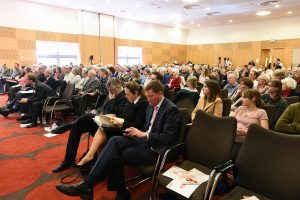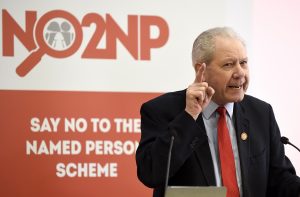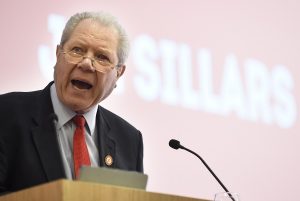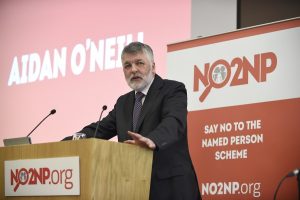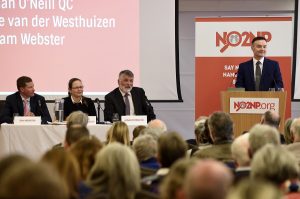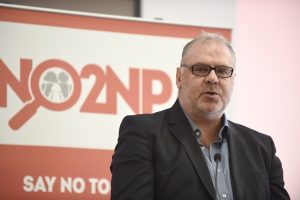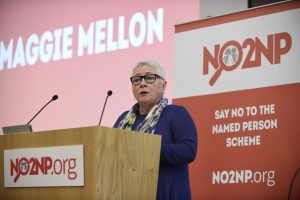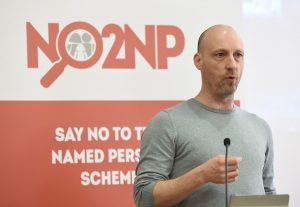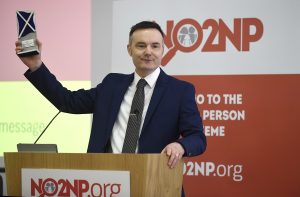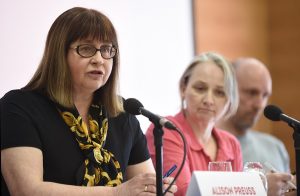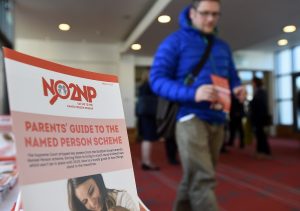Blog
Keeping you up to date on the progress of the Named Person scheme and the NO2NP campaign.
NO2NP event: Sillars tells Swinney ‘do a Hammond’ with Named Persons
Posted 9 years agoAround 250 people turned out for a NO2NP special event in Edinburgh on Monday in a major rally against the Named Person scheme. People travelled from all over, coming from Moray, the Borders, Perthshire, Dundee and even near Inverness!
Speakers at the John McIntyre Conference Centre included former deputy leader of the SNP Jim Sillars, and prominent human rights QC Aidan O’Neill who successfully represented campaigners involved with NO2NP in court.
Journalist and commentator Kevin McKenna and NO2NP supporters Dr Stuart Waiton and Maggie Mellon also took to the podium.
Jim Sillars urged Deputy First Minister John Swinney to “do a Hammond” on the Named Person scheme and drop the plans.
He said: “My advice would be to do a Hammond. Last week the government at Westminster was in a hole. It had the brains to stop digging and my advice to this government is this isn’t going to work.
“This is going to be a punishment on you over the years ahead. Stop digging, get out the hole and abandon it.”
Aidan O’Neill QC, a leading human rights lawyer who was behind the successful Named Person Supreme Court challenge, spoke about the judgment and its implications for families. He explained the law and why the Supreme Court ruled the way it did.
He said the Named Person legislation was written in a “vague language of aspiration when it should be talking specifically in terms of obligation” and that’s why the Supreme Court ruled that it was “not in accordance with law”.
He was then joined by two members of his legal team, Laura-Anne van der Westhuizen and Sam Webster, to answer questions from the audience about the judgment.
Journalist and commentator Kevin McKenna spoke about media reporting of the Named Person scheme and encouraged delegates to contact newspapers to tell their stories.
Speaking about the scheme he said: “My chief concern is that it will inevitably, even if inadvertently, target families who are encountering chronic social disadvantage”.
Independent social worker Maggie Mellon spoke about the culture and practice of children’s services on the ground. She said families had wanted a single point of contact for parents, but instead the Government had created in the Named Person scheme “a point of contact about parents”.
She added that the legislation had “made parents and families accountable to services, it didn’t in any way make services accountable to parents”.
Dr Stuart Waiton, sociology and criminology lecturer at Abertay University, said the Named Person scheme undermines families and the idea of privacy. He spoke about the influence of early intervention and how it was a key driver of the Named Person scheme.
NO2NP spokesman Simon Calvert spoke about the breadth and success of the NO2NP campaign and encouraged supporters to get involved.
The event finished with a lively question and answer session with NO2NP stalwarts Lesley Scott and Alison Preuss joining the panel.
Lesley and Alison also featured in an exclusive video, where they shared their experience of being involved in the campaign and the challenges that lie ahead.
The audience also viewed a moving video featuring two parents telling their stories about the Named Person scheme and the traumatic effect it had on their families.
Delegates were also encouraged to take armfuls of a new NO2NP leaflet, Parents’ Guide to the Named Person Scheme, which was launched at the event.
The handy guide is designed to help parents understand their rights following the Supreme Court judgment. You can request free paper copies by emailing admin@no2np.org or download a PDF version here.
Keeping up appearances of ‘getting it right’
Posted 9 years agoBy Alison Preuss of Home Education Forums
Back in September 2016, Deputy First Minister John Swinney reassured Parliament that Named Person schemes which were already operating on a non-statutory basis – including the much-vaunted Highland pilot – were not affected by the Supreme Court judgment because they were acting in accordance with the existing legal framework.
His assertion that it would be ‘business as usual’ drew sharp criticism from families across Scotland, whose personal data had already been collected and shared by public and third sector bodies without their knowledge or consent – and who had the damning evidence to prove it.
What’s more, current policy documents – including the Highland Practice Model and the practitioner toolkit published on Perth and Kinross Council’s website – proved beyond all doubt that non-consensual data processing had become well established and embedded across services over the preceding several years.
In a valiant effort to keep up appearances of ‘getting it right’ post-judgment, the Scottish Government sought to validate its own Named Person guidance by publishing an update on its website.
It claimed that the guidance “remains valid”, but that “some of the information will need to be revised”, namely the information sharing provisions of Part 4 and 5 of the Children and Young People (Scotland) Act 2014 as the ruling “requires these provisions to be amended in order for them to be compatible with Article 8 of the ECHR”.
Actually, the legislation needs to be re-drafted and approved by Parliament, and it will also need to comply fully with human rights and data protection laws to the satisfaction of the Supreme Court. Data processing without freely given informed consent is no longer a legislative option and legal remedies will be available to those whose rights have been breached.
The revised statement goes on: “The current draft statutory guidance on sections 23, 26, 27 and 40 should be disregarded for the time being, until it is revised following amendment of the provisions. Any information shared by and with those identified as Named Persons under GIRFEC policy can and should continue to operate in accordance with the existing legal framework and guidance on data sharing, human rights and children’s rights. This includes the Data Protection Act 1998 and the Human Rights Act 1998. Read the Policy Update on delivery of the Getting it right for every child approach here.”
In fact, current information sharing guidance does not accord with the existing legal framework, as upheld by the Supreme Court, since it encourages non-consensual data processing on the basis of any vague, undefined ‘wellbeing’ concern, as opposed to adherence to the legally permissible threshold of risk, or likely risk, of significant harm to a child.
The question remains: was the Deputy First Minister unaware of this?
NO2NP Roadshow roundup: Melrose, Broughty Ferry and Castle Douglas
Posted 10 years agoThe NO2NP Roadshow team has been really busy over the past week or so, clocking up three events in eight days (plus a great Action Day in between – more about that later in the week!). We’ve been responding to demand from various parts of the country to hold roadshow events in their area, so here’s a taste of what happened at these three venues:-
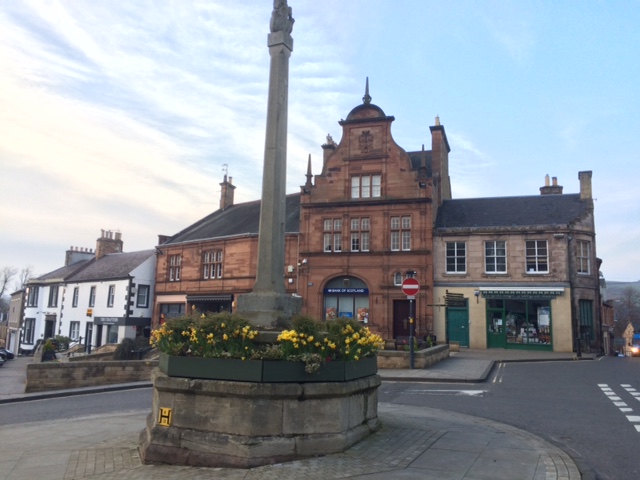
Melrose
Their first stop was the picturesque Borders town of Melrose on Monday night last week, when a good number of locals turned up to hear from the team.
Gordon Macdonald, Parliamentary Officer for CARE for Scotland, spoke about the reasons for the NO2NP campaign and referred to comments made online by Jim Terras, a Scottish Borders Council Training and Development Officer for Child Protection. Terras had remarked that he didn’t think the Government should be basing their opinions on the views of “fringe groups” opposed to the Named Person scheme, “who don’t really represent the general public”.

Gordon went on to point out that in a recent ComRes Poll, 64% of the Scots polled considered that the scheme was “unduly intrusive” into family life and 80% considered that the focus of child protection resources should be on truly vulnerable children and not every child.
We were then delighted to welcome Professor John Raven from Edinburgh to speak about his 50 years of academic experience in the areas of family, education and sociology. He said that parents are children’s most important educators in terms of instilling all the most important values in life, so having a Named Person to dictate what this should look like was quite wrong.
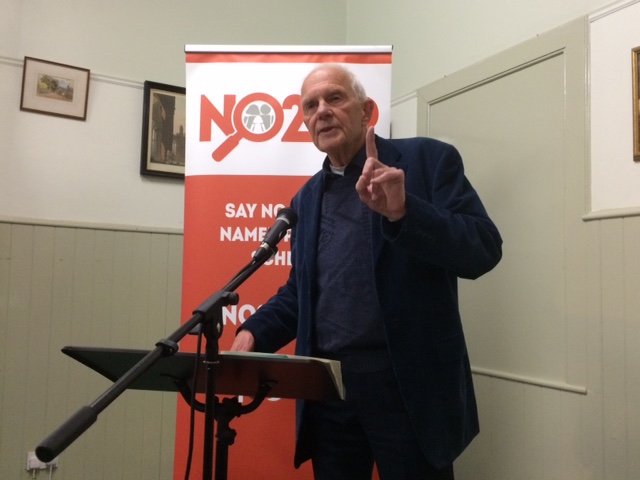
One of the things the Professor had noticed over his long career was the deprofessionalization of teachers, doctors and social workers by Government, who have increasingly imposed their own agenda on these professions. And now even parenting has been “deprofessionalized” under this scheme – in line with what is happening across society.
There was a lively Q&A, during which one mum asked the moving question: “Do the same people who failed my children so abysmally now think they can tell me they know better?”
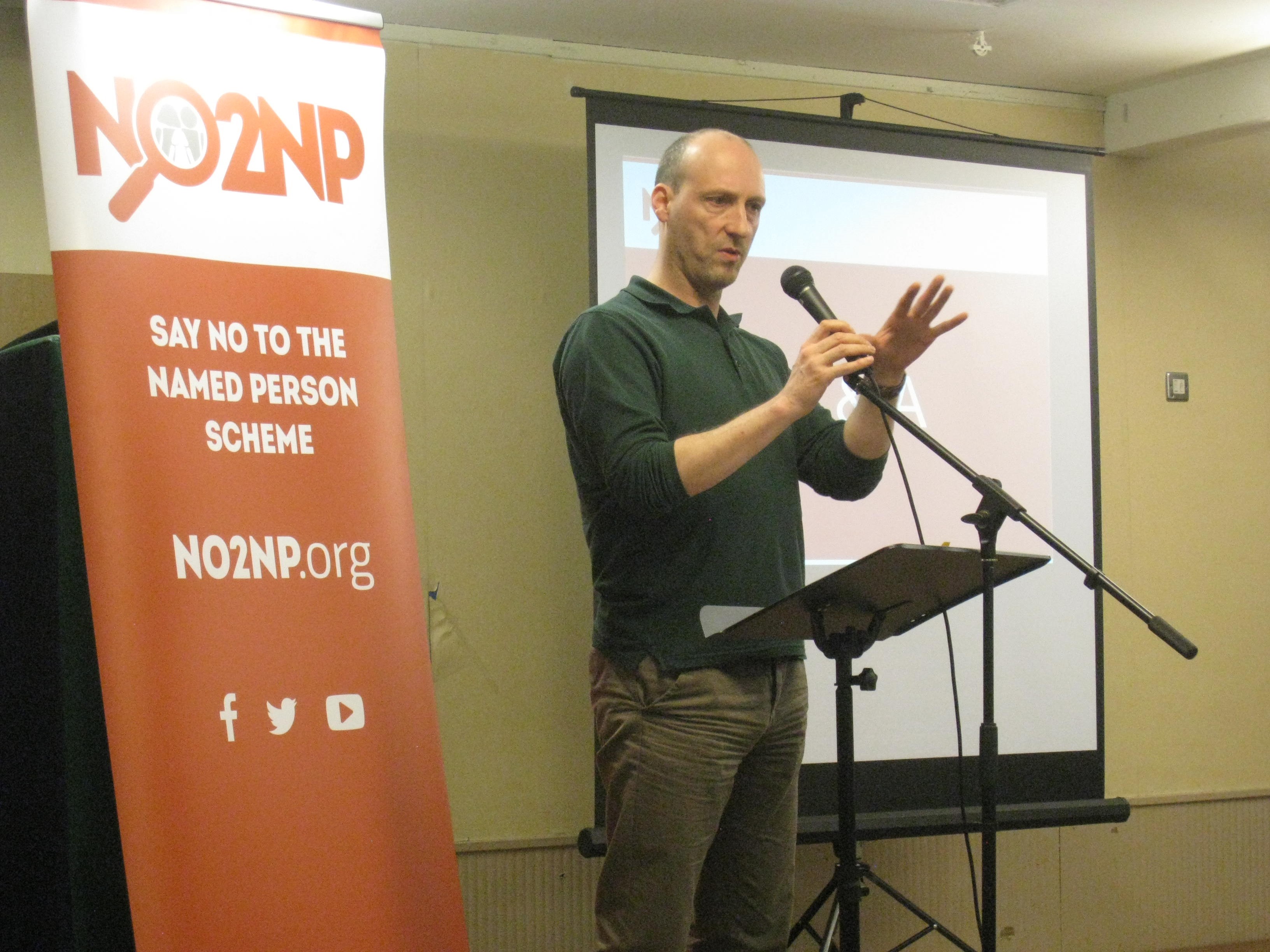
Broughty Ferry
The team’s next stop was Broughty Ferry last Friday to address a packed meeting at the town’s YMCA.
The meeting was chaired by Dr Stuart Waiton, a Sociology lecturer from Abertay University, who recently said that Tayside had some of the strongest opposition to the Named Person scheme. The passionate audience certainly had plenty to say, with one lady asking “What about the really vulnerable children? What will happen to them? They’ll go right down the list and be lost in the process!”
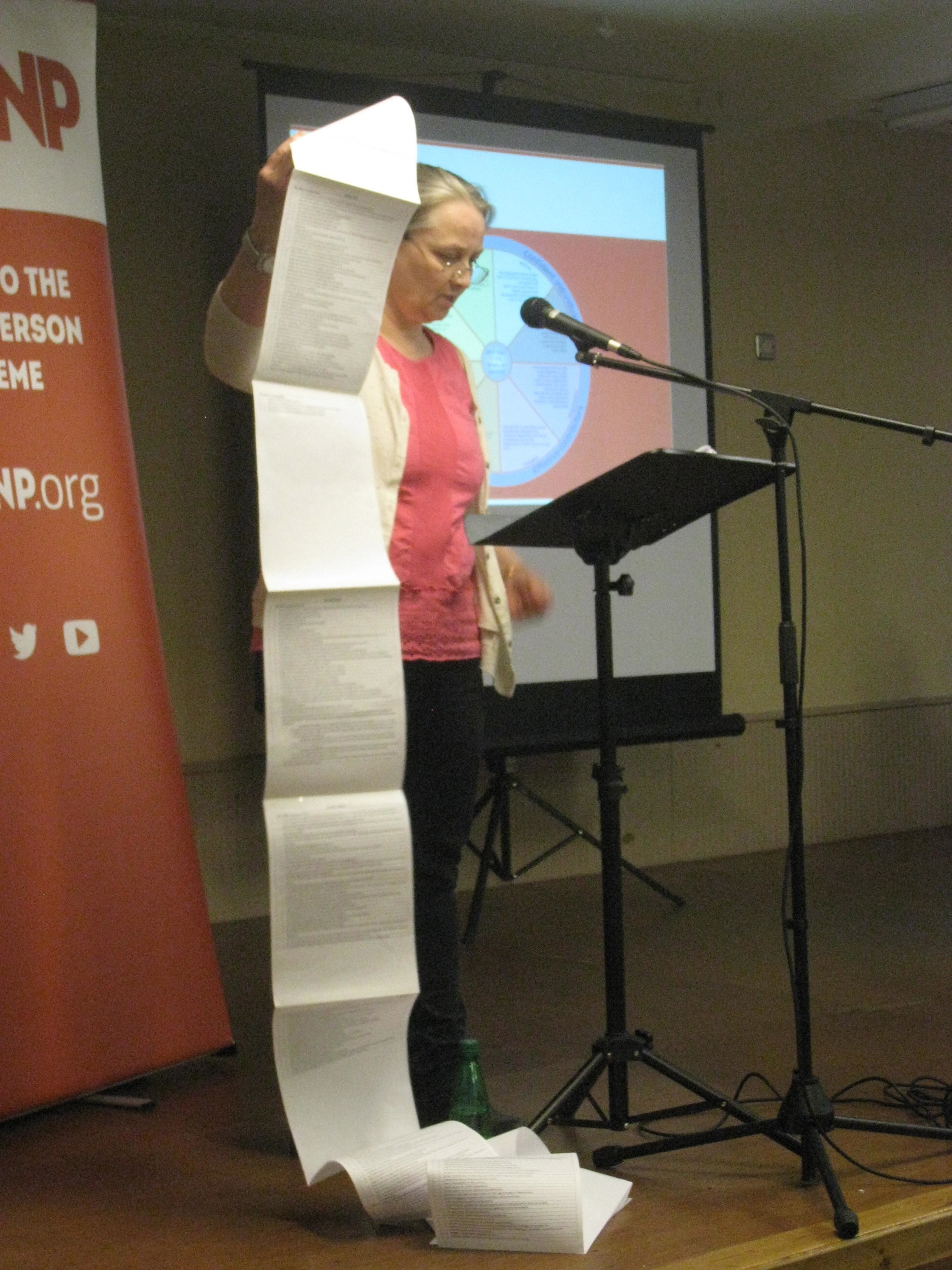
Lesley Scott from TYMES Trust set out how the Universal Health Visiting Pathway, due to be introduced on 31 August, will be a massive invasion of privacy for every young family in Scotland. A huge amount of sensitive information will be shared about their personal details, all intended to “promote, support and safeguard” the wellbeing of every child. However, the term “wellbeing” is nowhere defined in either the legislation or the guidance. This point was made in a video clip Lesley showed from a Holyrood debate last year, where an MSP in favour of Named Persons refused to answer a question about the definition of wellbeing, but instead ridiculed his colleague for asking the question.
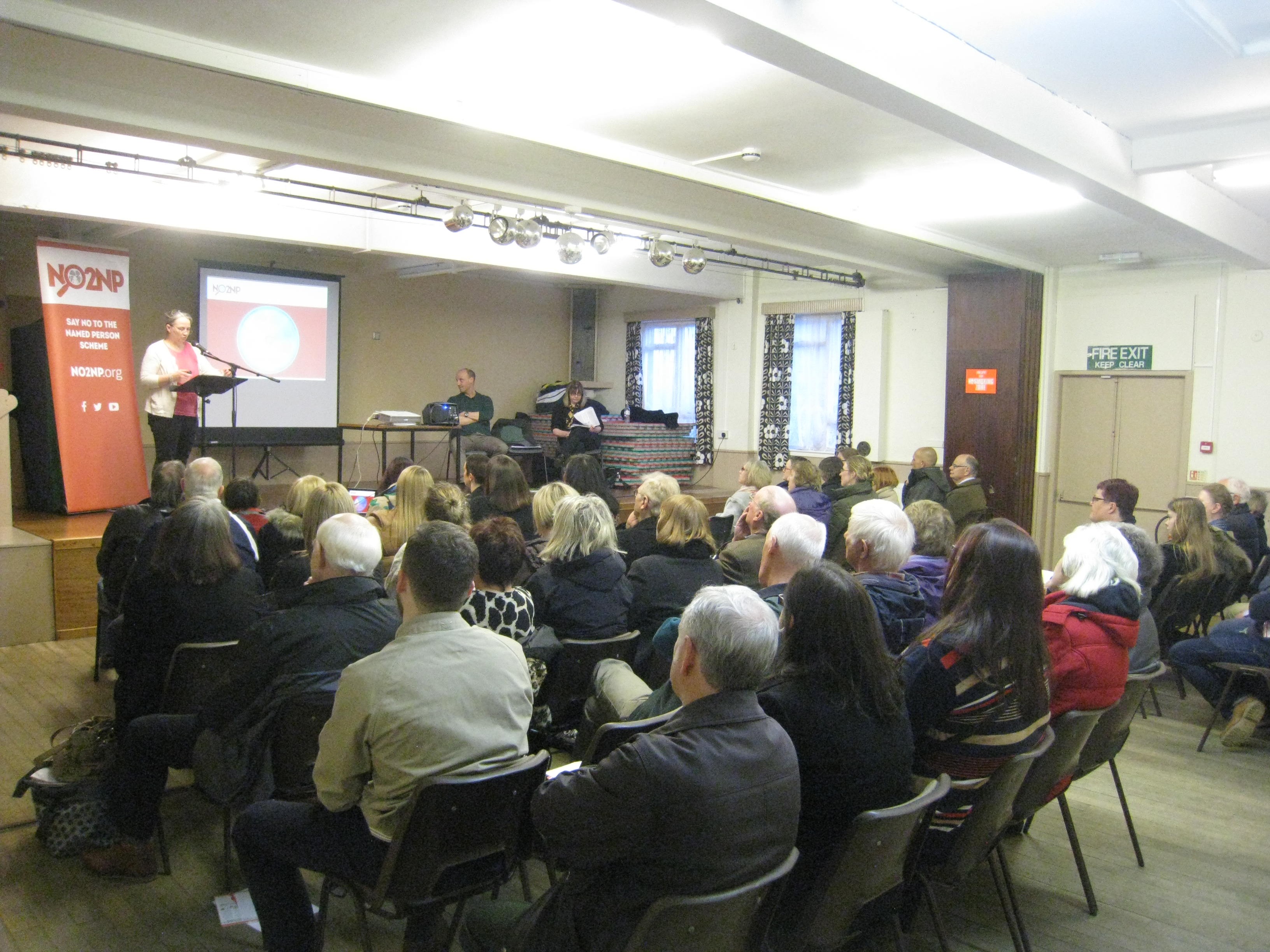
Lesley finished by saying: “Intervention is no longer about whether a child is at risk of significant harm, but rather whether the child is progressing in a manner the state regards as acceptable towards meeting outcomes set by the state.”
Alison Preuss from the Scottish Home Education Forum spoke about her background in elective home education and her experience in challenging breach of privacy law in various government schemes over the years.
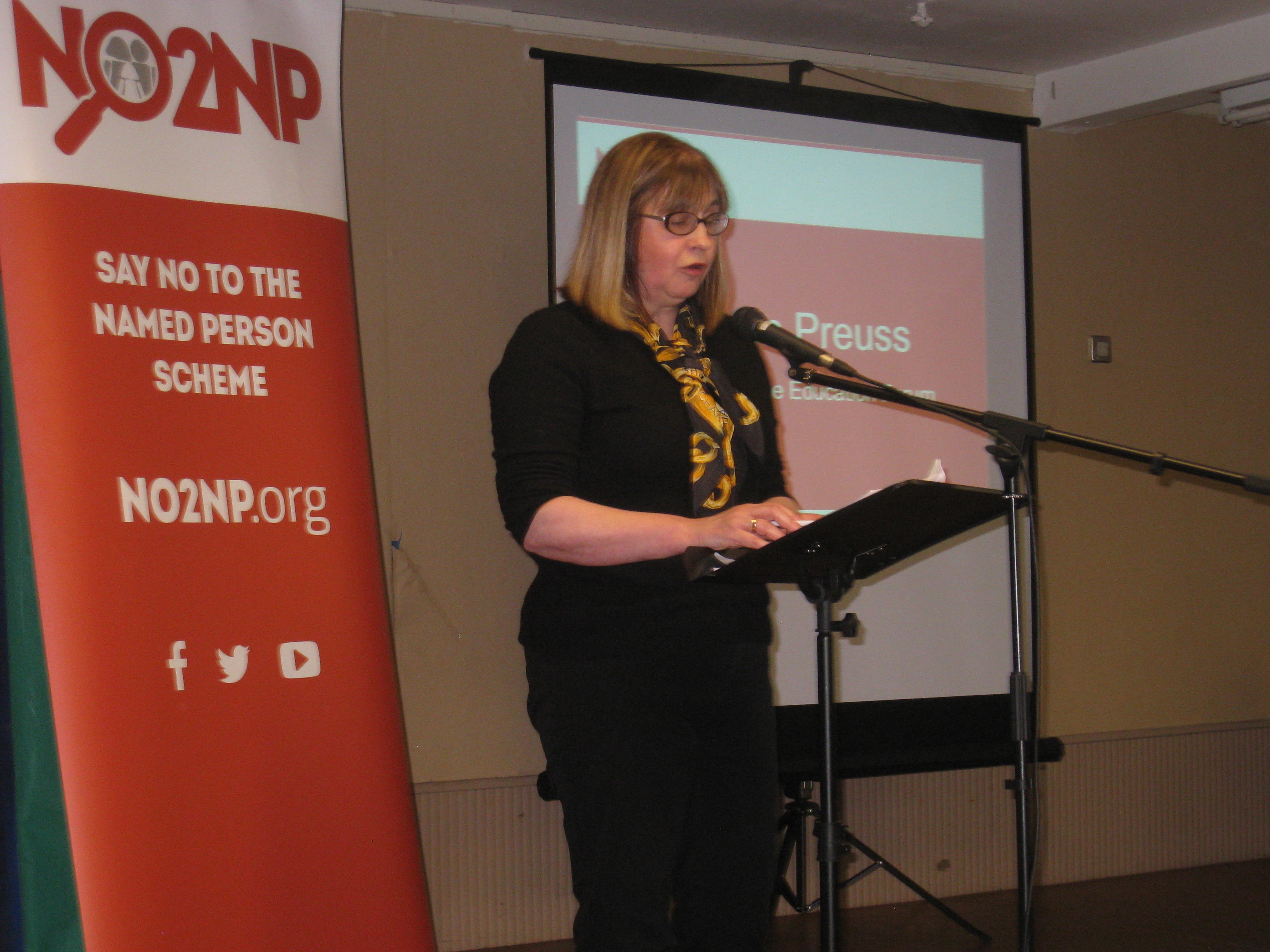
She made reference to the GIRFEC Cluedo article that appeared in the press recently. The aim of the game (used in training) is to get professionals to determine parents’ capacity to provide “wellbeing” by data mining without consent “at even the lowest level of concern”, as opposed to on child protection grounds. Alison went on: “Privacy is being systematically demolished on the basis of mere suspicion, allowing the state to call up a single view of any citizen at the click of a mouse, to more easily identify those of us in need of remediation”.
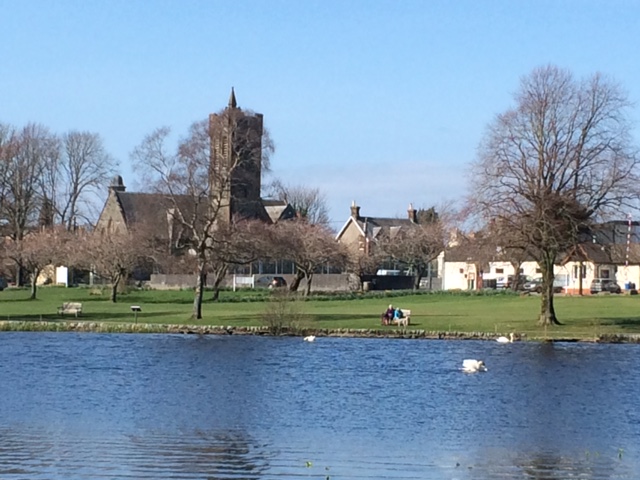
Castle Douglas
Then on Monday this week, the team traveled south to Castle Douglas, at the heart of scenic Dumfries and Galloway. The Christian Institute’s Nigel Kenny explained that one of the ways the Scottish Government planned to ‘teach’ young children the principles of “wellbeing” was by way of a snakes and ladders type game called On the Trail with the Wellbeing Snail.
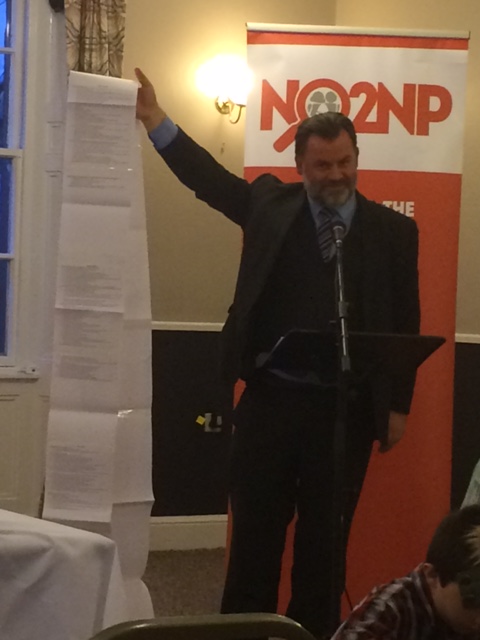
When Nigel explained that one of the cards for the game said that if you did not join the new after-school fencing club, you had to move back two spaces, one member of the audience asked us if we were making this up?! Not so, sadly. Others from the team mentioned the SHANARRI song and the GIRFEC Cluedo tool referred to earlier. The audience couldn’t believe that this was really happening! Nigel also pointed out that every named person would have to watch out for 222 risk indicators in each child or young person under their watch, which included: being under 5 years old, limited engagement by the parents and the parent having a different perception of the problem!
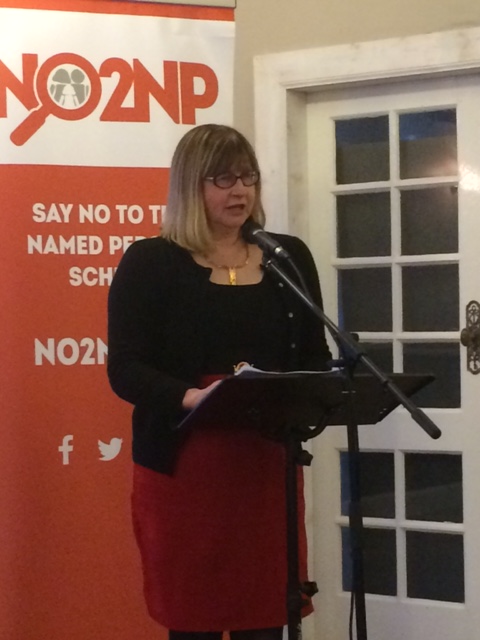
Alison Preuss said the acronym GIRFEC should really stand for Getting Information Recorded for Every Citizen. She pointed out that the principle of Named Persons was about being able to share sensitive data without the consent or even knowledge of the parents.
She highlighted datasharing concerns raised by a former UK Information Commissioner, Richard Thomas CBE, about an abandoned scheme similar to Named Persons, called ContactPoint. He said: “There are reasons why we need to promote better information sharing where children are at risk of harm, but whether the answer is to database every child in the country should be seriously questioned.”
Alison finished by quoting former US President Lyndon B Johnson, who once said: “You do not examine legislation in the light of the benefits it will convey if properly administered, but in the light of the wrongs it would do and the harms it would cause if improperly administered.” The Scottish Government failed to observe this principle, but NO2NP has been holding them to account throughout our campaign, highlighting the numerous problems with the legislation.
The NO2NP Team will be in Coatbridge on Wednesday next week. If you can join us, we look forward to meeting you!
NO2NP ROADSHOW: ABERDEEN
Posted 10 years agoThere was a packed gathering in Aberdeen on Monday night for the latest stop of the NO2NP Roadshow. Folk from a wide range of backgrounds came to hear our panel share their concerns about the invasive Named Person scheme.
The opening speaker, an academic who wishes to remain anonymous, pointed out parallels between the desire of socialist states to control society, with the Named Person scheme and its all-encompassing influence over every aspect of family life. He said while the Named Person scheme was intended to catch the bad parents, the effect will be that everyone will actually be trapped by it.
The speaker spoke movingly of his own family’s experience at the hands of proto-Named Persons who had misunderstood issues with his own children, leading him to submit a Subject Access Request under the Data Protection Act to see what had been recorded about his children. He was shocked to discover a 60-page document and even more appalled to find that huge swathes of it had been redacted – blotted out in black, because allegedly these issues did not relate to him or his children!
He also spoke about the weaknesses of the complaints procedure, something that the Scottish Public Service Ombudsman has recently expressed concerns about too. He found that his complaint had only resulted in the conclusion that “professionals are entitled to make professional judgments” and his only recourse now would be to go to judicial review, something his solicitor said would cost him at least £15,000!
The speaker also expressed his concern for the health and teaching professionals who will be landed with this huge responsibility, with their careers on the line should anything go wrong on their watch. “They’re not trained to be police detectives”, he remarked, concluding that he hoped the NO2NP campaign would relieve these professionals of their anxiety by securing an end to the scheme!
Next up was Lesley Scott from TYMES Trust, who said that the Named Person legislation had introduced an “authoritarian and illiberal scheme”, which “poses a considerable threat to family autonomy.” Lesley went on to talk about the National Practice Model, which is the GIRFEC ‘toolkit’. It is used to assess the ‘wellbeing’ of every child in Scotland and enables practitioners to investigate and assess all associated adults.
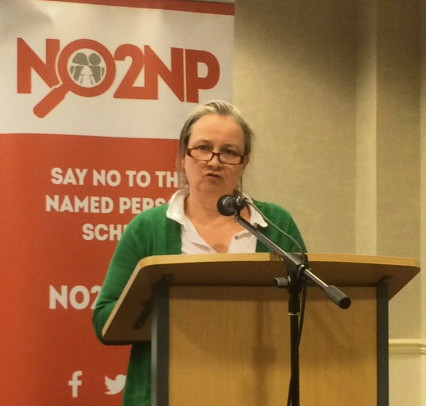
However, no one is quite sure what ‘wellbeing’ really means. This was highlighted in a debate in the Scottish Parliament in December last year, when MSP Alex Johnstone asked SNP MSP Stewart Maxwell if he could define wellbeing. Lesley played a video of the exchange, during which Mr Maxwell berated Mr Johnstone for asking such a “ridiculous” question – yet he still wasn’t able to answer it!
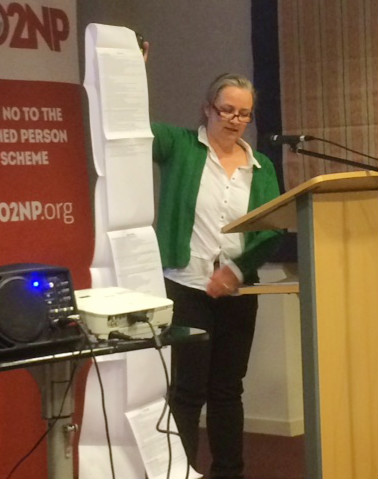
Lesley went on to explain that the “wellbeing wheel” was based on the eight SHANARRI indicators, and it also had some 304 “outcome signifiers”. She went on to highlight the complete vagueness of what constituted a “wellbeing concern”, which the Government’s guidance says can be “any matter…arising from any factor”. Lesley then explained how a child’s life is mapped out using such tools as the My World Triangle, the Resilience-Vulnerability Matrix and the three-staged National Risk Framework, where 222 “risk indicators” include: being under 5 years old, illness within the extended family, experience of bereavement, parental resistance or limited engagement, or the parent having a different perception of the problem. Lesley concluded by saying: “This GIRFEC legislation is founded on universal suspicion. It pours doubt upon parents and families, eroding the autonomy and uniqueness of family life. In short, it relegates parents to little more than the registered keepers of their own children.”

Alison Preuss of the Scottish Home Educators Forum then showed a video of Maureen Falconer of the Information Commissioner’s Office, explaining in a tutorial before the legislation had been passed that the Children and Young People (Scotland) Bill would “lower the trigger” not only for sharing information (down from “risk of significant harm” to “any wellbeing concern”) but also for child protection-like intervention. Alison suggested that Maureen seemed to put “sharing before caring”, in other words sharing data about families whenever Named Persons deemed it “appropriate”. This has been made possible because the Scottish Government passed ‘enabling’ legislation to make it legal to bypass the reserved UK-wide Data Protection Act, but only north of the border, “where children are apparently at disproportionate risk from their parents”, she said. Alison continued: “by lowering the threshold for state interference, every child and family member will be compulsorily databased and profiled so that dissenters can be easily identified and suitably ‘remediated’.” She went on: “The fact is that GIRFEC leaves Scots citizens with less legal protection than their counterparts in the rest of the UK when it comes to the use of their personal information.”
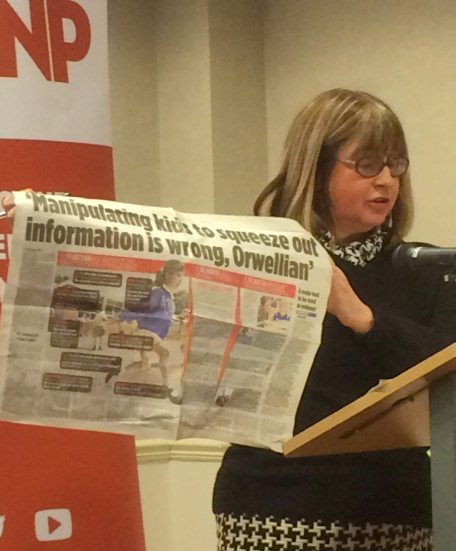
Alison held up a copy of the Mail on Sunday, which carried a major story in both its UK and Scottish editions about the covert psychological profiling of pupils in our schools and even nurseries. When she last looked, it had been shared 4300 times and there has been wall to wall outrage on social media.
Alison concluded by telling those gathered: “You should be aware that your children’s most personal thoughts and feelings are being interrogated in classrooms in the guise of ‘resilience testing’ without your knowledge, let alone consent.
Messing with young minds should not be the remit of school teachers, but has become routine with the introduction of the Curriculum for Excellence which, not very coincidentally, shares the same “well-behaving” outcomes as GIRFEC. Children are being moulded into compliant citizens who can be more easily micro-managed through life. Any dissent will be quickly identified and quashed by a series of interventions to get them back on to their state approved path of ‘getting it right’-eousness”.
Nigel Kenny from The Christian Institute then reminded the audience that our judicial review is due to be heard in the Supreme Court next Tuesday and Wednesday and, if successful, would “strike down” the legislation and nullify it before it comes into force in August. But the legal challenge is only one part of the campaign – the other part is grassroots public opposition to the unpopular scheme to let the Scottish Government know that its citizens are saying “NO to Named Persons” across the country. Several people signed up as volunteers, many of them committing themselves to join us on Saturday morning for our Action Day in the city centre. If you are free to help us raise the campaign’s profile in the Granite City, please contact us on volunteers@no2np.org
NO2NP Roadshow in Dingwall
Posted 11 years agoThank you to everyone who came to the NO2NP roadshow meeting in Dingwall Town Hall last Wednesday (4 March).
A large crowd heard Lesley Scott (Tymes Trust) explain that the named person role has expanded beyond the idea of a single point of contact and usurps the natural rights of parents. She warned that the named person has lowered the threshold for intervention based on the ‘SHANARRI’ indicators and branded the scheme as “state mandated parenting” and an oppressive intrusion into family life.
The crowd also heard from Alison Preuss (Schoolhouse) who noted that the Isle of Man abandoned a similar scheme after a melt-down in social work, She said it was a scandal that resources were being diverted into a universal scheme.
On Monday 23 March the NO2NP roadshow returns to Glasgow for a meeting at the Hilton Glasgow Grosvenor Hotel in the West End where the audience will hear from Dr Stuart Waiton (Abertay Univeristy) and various others. The meeting will start at 7:30pm and is free and open to all. We hope to see you there.
NO2NP roadshow visits Montrose
Posted 11 years agoLast night (26th November) the NO2NP roadshow visited Montrose. A lively meeting was held which was addressed by Lesley Scott of Tymes (Young ME sufferers) Trust and Alison Preuss of Schoolhouse.
Lesley Scott said that the named person scheme – which she warned was state control of children – usurps the role of parents and lowers the threshold for intervention. She explained that though the Children’s Minister, Aileen Campbell, had said that parents don’t need to engage, this is not in the legislation and there is no clear explanation of what non-engagement means. She warned that those who did seek to withdraw may be subject to further intervention.
Alison Preuss described the relevant section of the Children & Young People (Scotland) Act as a “tartan Trojan horse” and said that no family was now safe from routine state intervention. She also spoke about the ‘ChildrenCount’ surveys which had been carried out in Angus and other parts of Scotland in recent weeks.
Last night’s meeting was the eighth roadshow held by the NO2NP campaign since August. If you would like the roadshow to come to your area, please contact us at admin@no2np.org, and we may be able to arrange this.
NO2NP Roadshow comes to Perth
Posted 11 years agoLast night (12th November) the NO2NP roadshow visited Perth, which was the seventh meeting since the roadshow kicked off back in August. The meeting also coincided with the ongoing judicial review of the named person legislation, taking place this week at the Court of Session in Edinburgh.
The main speaker was Dr Stuart Waiton of Abertay University. Dr Waiton spoke about how the idea that children are vulnerable and “at risk” has escalated in recent years and that there is an expectation that parents need guidance and support. He argued that there is very little recognition of the importance of privacy and that families have become increasingly “invisible” in social policy and law, with the term not being mentioned at all in the Children & Young People Act.
The meeting was also addressed by Lesley Scott from Tymes Trust, who work on behalf of young people with ME. She said that the named person usurped the rights of parents and had lowered the threshold for intervention. She branded the scheme “oppressive”, “illegal” and an “intrusion into family life”.
The NO2NP roadshow continues in two weeks’ time in Montrose on 26th November, where speakers will again include Lesley Scott and also Alison Preuss of Schoolhouse. More details available here.
**If you were planning to attend the court hearing this week and expected to find details on our website, unfortunately the demands on the court meant larger court rooms were unavailable. The court room assigned to the case only has a very small public gallery.**
NO2NP roadshow comes to Inverness
Posted 11 years agoThe NO2NP roadshow resumed last night (1 October) with a well attended meeting at Glenmoriston Town House in Inverness. This was the first time that the roadshow had visited the Highlands, which is where a pilot version of the named person scheme has already been implemented.
The meeting was chaired by Dr Stuart Waiton of Abertay University who argued that “parenting has been professionalised” and ridiculed the SHANARRI “wheel of misfortune” used to assess child ‘wellbeing’.
The first speaker was Maggie Mellon, an independent consultant and writer on social work and family issues, who said the legislation “represents a denial of families”. She noted that family isn’t mentioned in the legislation and that families are seen as caretakers on behalf of government, adding that “the state makes an absolutely lousy parent”. She argued that “there is no evidence to support the imposition of named persons” and predicted “a huge misuse of resources”.
Next up was Alison Preuss, Co-ordinator and Press Officer at Schoolhouse Home Education Association, who said that “children’s rights are being selectively applied”. She told the audience about the infamous ‘Evidence2Success’ and ‘ChildrenCount’ surveys which have been operating in different parts of Scotland. She also discussed the Highland named person pilot scheme, describing it as “very selective” and said that those parents in Highland who have complained have been ignored.
The meeting ended with an extremely lively and informative question and answer session.
The next date for the NO2NP roadshow is Wednesday 15th October in Aberdeen – full details available here.






